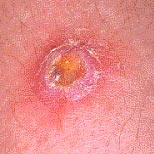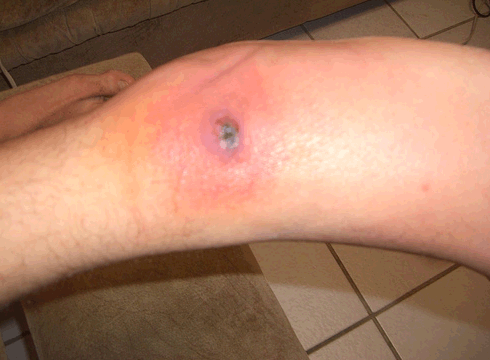




DISEASE INFORMATION GUIDE
 MRSA
MRSA
Methicillin-Resistant Staphylococcus aureus, commonly known as MRSA, is a strain of Staph infection that is highly resistant to most antibiotics.
Methicillin-Resistant Staphylococcus aureus, commonly known as MRSA, is a strain of Staph infection that is highly resistant to most antibiotics. It spreads very easily, and can be extremely difficult to treat and cure. Those with weakened immune systems are especially susceptible to MRSA infection; Healthcare-associated MRSA (HA-MRSA) and Community-associated MRSA (CA-MRSA). HA-MRSA infections occur in individuals who's immune systems have been weakened by recent medical treatment, and even in those who haven’t. The cramped corners of a Hospital help spread HA-MRSA fast. CA-MRSA occurs in healthy people outside of a hospital setting. Infections can spread though the sharing of razors and towels, or just through touching things that someone infected with CA-MRSA has touched. This can occur almost anywhere, and is more common in places like Schools and Daycares, where students are coming into lots of primary and secondary physical contact. Police and Emergency Service professionals are also at high risk.
Method Of Transmission
MRSA can be spread via person-to-person contact, through airborne transmission, or by touching objects and surfaces contaminated by someone with MRSA. MRSA can enter the body though the respiratory tract or via cuts, sores, and other openings on the skin. MRSA is generally classified into two categories,
 FOR SKIN MRSA INFECTIONS
FOR SKIN MRSA INFECTIONS
-Boils
-Swollen, painful, red areas on the skin
-Skin Abscess
-Fever
FOR SERIOUS MRSA INFECTIONS
-Chest pain
-Cough
-Fever
-Fatigue
-Large, open sores
-Malaise
-Chills
-Headache
-Muscle Ache
-Shortness of Breath
Complications
MRSA can stop at a skin infection, but if left untreated, can move on to infect the respiratory and cardiovascular systems. Serious cases of MRSA can lead to Blood poisoning, Cellulitis, Infected Heart Valves, Pneumonia, and Toxic Shock Syndrome. MRSA can infect the lungs, heart, and bloodstream, resulting in serious medical complications.
Treatment
Dependign on the severity of your infection, draining the MRSA sores on the skin may be the only treatment necessary. More serious MRSA infections may require the use of Antibiotics. HOWEVER, MRSA came to be when a normal staph bacteria became resistant against most common modern antibiotics. There are still a handful of antibiotics that still work on MRSA, but in time MRSA may develop a resistance to these as well. The best cure is Prevention. Use hand sanitizer frequently, cover your mouth when you cough or sneeze, and follow good health practices. If you or someone you know has a weakened immune system, from medical work, age or disease, you may want to look into the Bio-Spray decontamination treatment services.
For More Information on How Bio-Clean Can Control Disease Outbreaks,
Large or
Small Scale Decontamination, Infection and Influenza Control,
or The BioSpray Infection Control System:
Call 1-800-4-BIO-CLEAN
HOW IT WORKS | BIOSPRAY: THE FUTURE OF INFECTION CONTROL | ATP TESTING | FLU CONTROL
WHAT OTHER DISEASES CAN BIOSPRAY HANDLE?
Due to the ability of germs, bacteria and viruses to become airborne and/or be carried into previously treated areas, we cannot guaranty the prevention or transmission or spread of any illnesses listed above or not otherwise mentioned. Please use good housekeeping practices as a first degree of prevention, wash hands often, and follow preventative measures provided by health organization
Homicides & Suicides | Belatedly Discovered Individuals | Jail Cells & Patrol Cars | Meth Labs | Tear Gas Vehicle Decontamination | Restoration Services | Hoarding
Allergy Solutions | Industrial Accidents | Graffiti | Diseases |Sewage | Animal Decontamination | Document Restoration | Water Damage Restoration
Bed Bug Remediation | Personnel | FAQs | Guarantee | Contact Us | News Stories | Links
Copyright © Andrew Yurchuck LLC T/A Classic Cleaning/Bio-Clean of New Jersey
All Rights Reserved 2008-2010